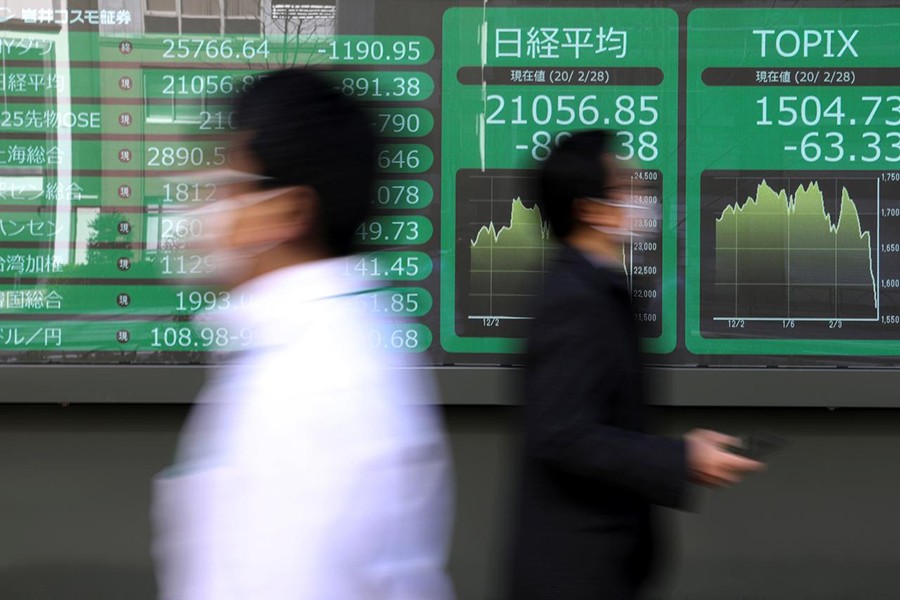World share markets were headed for their worst week since the depths of the 2008 financial crisis as investors ditched risky assets on fears the coronavirus would become a pandemic and trigger a global recession.
Stock futures showed European indexes set to track the rout in their Asian counterparts on Friday, which comes after another massive selloff on Wall Street overnight.
Hopes that the epidemic that started in China would be over in a few months and economic activity would return to normal have been shattered, as new infections reported around the world now surpass those in China.
The worsening global threat from the virus prompted investors to rapidly step up bets the US Federal Reserve would cut interest rates as soon as next month to support economic growth.
“We don’t even need to wait for economic data to see how badly the economy is being hit. You can tell that the sales of airlines and hotels are already falling by a half or something like that,” said Tomoaki Shishido, senior economist at Nomura Securities.
On top of disruptions to international travel and supply chains, economic damage also seems inevitable as governments ordered schools shut and cancelled big gatherings to halt the spread of the pathogen.
“It is fair to say the impact of the coronavirus will be clearly much bigger than the US-China trade war. So the Fed does not have a reason to take a wait-and-see stance next month,” Shishido said.
MSCI all country world index .MIWD00000PUS fell 0.6 per cent after 3.3 per cent drop on Thursday. So far this week it has lost 9.4 per cent, on course for its biggest weekly decline since a 9.8 per cent plunge in November 2008.
Wall Street shares led the rout as the S&P 500 fell 4.42 per cent, its largest percentage drop since August 2011, on Thursday. It has lost 12 per cent since hitting a record close on February 19, marking its fastest correction ever in just six trading days.
The CBOE volatility index , often called the “fear index”, jumped to 39.16, the highest level in about two years, well out of the 11-20 range of recent months.
The index, which measures expected swings in US shares in the next 30 days, typically shoots up to around 50 when bear market selling hits its heaviest and approached almost 90 during the 2008-09 financial crisis.
European shares are expected to dive more than 3 per cent, with Euro Stoxx 50 futures STXEc1 down 3.18 per cent, German DAX futures FDXc1 shedding 3.46 per cent and FTSE futures FFIc1 losing 3.29 per cent. US stock futures ESc1 fell 1.5 per cent in Asia pointing to another bumpy Wall Street session.
In Asia, MSCI's regional index excluding Japan .MIAPJ0000PUS shed 2.7 per cent. Japan's Nikkei slumped 4.3 per cent on rising fears the Olympics planned in July-August may be called off due to the coronavirus.
“The coronavirus now looks like a pandemic. Markets can cope even if there is big risk as long as we can see the end of the tunnel,” said Norihiro Fujito, chief investment strategist at Mitsubishi UFJ Morgan Stanley Securities. “But at the moment, no one can tell how long this will last and how severe it will get.”
World Health Organization Director General Tedros Adhanom Ghebreyesus said the virus could become a pandemic as the outbreak spreads to major developed economies such as Germany and France.
About 10 countries have reported their first virus cases over the past 24 hours, including Nigeria, the biggest economy in Africa.
The global rout knocked mainland Chinese shares lower, which have been relatively well supported this month, as new coronavirus cases in the country fell and Beijing doled out measures to shore up economic growth.
The CSI300 index of Shanghai and Shenzhen shares dropped 2.9 per cent, on track for its first weekly loss in three.
“Economic troubles outside China, especially in the US, could hurt the Chinese economy. Foreign investors, who were buying Chinese shares after the Lunar New Year holidays, have become a net seller since late last week,” said Wang Shenshen, senior China equity strategist at Mizuho Securities. “Their selling might have intensified today.”
Fears of a major economic slump sent oil prices to their lowest in more than a year.
US crude futures CLc1 fell 3.2 per cent to $45.59 per barrel, having lost 14.5 per cent so far on the week, which would be the deepest fall in nearly nine years.
Investors flocked to the safety of high-grade bonds. US yields plunged with the benchmark 10-year notes yield hitting a record low of 1.241 per cent. It last stood at 1.247 per cent US10YT=RR.
That is well below the three-month bill yield of 1.436 per cent US3MT=RR, deepening the so-called inversion of the yield curve. Historically an inverted yield curve is one of the most reliable leading indicators of a US recession.
Expectations the Fed will cut interest rates to cushion the blow are rising in money markets. Analysts say Fed funds futures are now pricing in about a 75 per cent chance of a 25 basis point cut at the central bank’s March 17-18 meeting.
On the other hand, junk bond ETF prices fell to multi-month lows on fears of increasing bankruptcies among highly leveraged companies, with the energy sector hit hard by falls in oil prices.
In currency markets, the yen rose 0.6 per cent to a near one-month high of 108.86 to the dollar.
The euro stood at $1.0993 after Thursday's jump of over 1 per cent, the biggest gain in more than two years as investors wound back bets against the currency versus the dollar.
The risk-sensitive Australian dollar lost 0.7 per cent to an 11-year trough of $0.6520.
The New Zealand dollar shed 1.0 per cent to $0.6233, near a four-year low of $0.6204 touched in October. New Zealand confirmed its first case of coronavirus on Friday.


